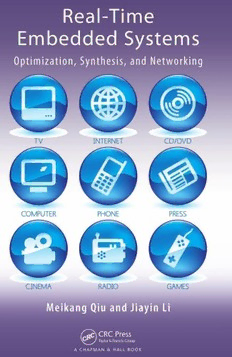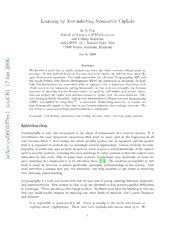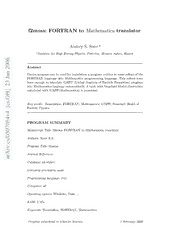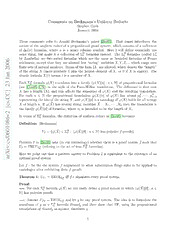
Real-time Embedded Systems: Optimization, Synthesis, and Networking PDF
226 Pages·2011·2.068 MB·English
Most books are stored in the elastic cloud where traffic is expensive. For this reason, we have a limit on daily download.
Preview Real-time Embedded Systems: Optimization, Synthesis, and Networking
Description:
Ubiquitous in today’s consumer-driven society, embedded systems use microprocessors that are hidden in our everyday products and designed to perform specific tasks. Effective use of these embedded systems requires engineers to be proficient in all phases of this effort, from planning, design, and analysis to manufacturing and marketing.Taking a systems-level approach, Real-Time Embedded Systems: Optimization, Synthesis, and Networking describes the field from three distinct aspects that make up the three major trends in current embedded system design.The first section of the text examines optimization in real-time embedded systems. The authors present scheduling algorithms in multi-core embedded systems, instruct on a robust measurement against the inaccurate information that can exist in embedded systems, and discuss potential problems of heterogeneous optimization. The second section focuses on synthesis-level approaches for embedded systems, including a scheduling algorithm for phase change memory and scratch pad memory and a treatment of thermal-aware multiprocessor synthesis technology. The final section looks at networking with a focus on task scheduling in both a wireless sensor network and cloud computing. It examines the merging of networking and embedded systems and the resulting evolution of a new type of system known as the cyber physical system (CPS).Encouraging readers to discover how the computer interacts with its environment, Real-Time Embedded Systems provides a sound introduction to the design, manufacturing, marketing, and future directions of this important tool.
See more
The list of books you might like

What Happened to You?
Bruce D. Perry
·2021
·4.38 MB

The Spanish Love Deception
Elena Armas
·2021
·6.45 MB

Credence
Penelope Douglas
·487 Pages
·2020
·0.86 MB

A Thousand Boy Kisses
Tillie Cole [Cole
·2016
·1.66 MB

The Princess and the Goblin
George MacDonald
·129 Pages
·4.258 MB

BY: / DL ABIGAIL HANGER, et al.
21 Pages
·2015
·1.12 MB

ERIC ED381386: Technology Learning Activities I.
ERIC
·36 Pages
·1993
·1.1 MB

Wirtschaftskrisen: Geschichte und Gegenwart (German Edition)
Plumpe, Werner
·2010
·0.261 MB

DTIC ADA475332: Weapons, 2006
Defense Technical Information Center
·1.3 MB

Healthcare Financial Management 1993: Vol 47 Index
5 Pages
·1993
·1.9 MB

Bürofach-/Handelsdiplom VSH Med. Sachbearbeiterin+ Röntgen-Grundkurs
12 Pages
·2017
·2.29 MB

Bürgerliches Recht Band II Schuldrecht Allgemeiner Teil
Univ.-Prof. Dr. Silvia Dullinger (auth.)
·186 Pages
·2008
·0.62 MB

Vascular Flora of Isla del Coco, Costa Rica
Trusty, Jennifer L
·2006
·2.3 MB

C-uppsats_30 maj
Cecilia Dellow
·43 Pages
·2013
·0.42 MB

Calixarene Complexes with Transition Metal, Lanthanide and Actinide Ions
23 Pages
·2003
·0.63 MB

Amazon Cognito - 개발자 안내서
478 Pages
·2017
·2.37 MB

C uppsats Joni & Anton rev.2 .docx
36 Pages
·2015
·0.31 MB

The Long Call (Two Rivers, #1)
Ann Cleeves
·0.4664 MB

Greek Government Gazette: Part 3, 2006 no. 444
The Government of the Hellenic Republic
·2006
·0.11 MB

Learning by Test-infecting Symmetric Ciphers
K. S. Ooi
·0.18 MB

f2mma: FORTRAN to Mathematica translator
A. S. Siver
·0.1 MB

Comments on Beckmann's Uniform Reducts
Stephen Cook
·0.06 MB

c Copyright 1996 Anthony G. LaMarca - Computer Science
144 Pages
·2003
·0.67 MB
Most books are stored in the elastic cloud where traffic is expensive. For this reason, we have a limit on daily download.

